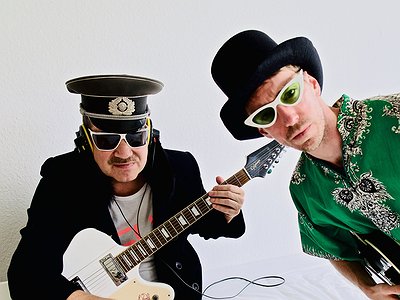Name: Halwa
Members: Christoph Eix and André Willing
Nationality: German
Current release: Halwa are one of the acts featured on Compost Record's formidable Future Sounds of Kraut compilation, compiled by Fred und Luna.
Kraut-related recommendations:
Leafcutter John - Yes! Come Parade With Us
Panda Bear - Person Pitch
MMOSS - I
Hills - Frid
[Read our Fred und Luna interview]
For other artists featured on the Future Sounds of Kraut compilation, read our Pyrolator interview and our Sankt Otten interview.
How would you describe your personal relationship with Krautrock?
Krautrock is the freest form of music making. Without fixed structures, but with an exploratory character. That's what has always fascinated us about it.
In his Krautrock Sampler, Julian Cope suggests that the actual Krautrock phase lasted only a few years. Are you interested in the history of Kraut – and if so, what are defining moments for you? Where do you draw the bracket for the first, classic period?
We would say the classic period was from 1969 to 1975. For us, all albums that Conny Plank produced within that period are kind of important.
And basically releases from labels like Brain and Ohr.
Kraut drew inspiration from a lot of influences. Which of these would you say were most prominent?
Progressive Rock, Free Jazz and artists like Stockhausen, Pierre Henry as well as Minimal Music (Steve Reich, Terry Riley) were the obvious influences in our opinion.
What was it about Krautrock that particularly attracted you as a listener?
As listeners we were attracted to Krautrock because of the hynotic element of the music and the freedom to express yourself without boundaries.
Tell me about the albums and artists that stand out for you?
Kraftwerk (early work), Neu!, Harmonia, Cluster, Can, Ash Ra Temple.
[Read our Manuel Göttsching of Ash Ra Temple interview]
Some believe the well for discovering hidden Kraut gems has dried up. Do you still stumble upon amazing music from the magic Kraut era that you'd never heard (of) before? Do you think there are still vaults with hidden gold in them?
We think that the gold has all been mined already. There may be hidden gems to be found in the future, but the essentials are already discovered.
What, to you, are the main elements that make something Kraut? What are the practises of the musicians from the 70s that inspire your own practise today?
The hypnotic aspect of music that results from playing melodies and riffs repeatedly with only small changes.
When did you start making use of Kraut elements in your music?
At first we produced techno and house music. But then we got bored of that and started producing krautrock in 2017. We found it much more appealing and freeing.
Could you describe your creative process on the basis of one of your own Kraut-leaning pieces, live performances or albums that's particularly dear to you, please?
We start with a drone, rhythm or sequence and take it from there. We let the music and our mood guide us.
I got into Kraut via Tangerine Dream and early Ash Ra and to me, the motoric beat was never quite as important. Today, it seems as though it's the most important defining element. Are you interested in it? Are you making use if it? What makes it special to you?
It‘s similar to dance music and a lot of ethnic music as it provides a steady pulse to the music, which allows the musicians to improvise around it without having to adhere to a structure.
It would seem that to Julian Cope, the prominent inclusion of synthesizers was somewhat of an exclusion criterion for Krautrock. Interestingly, today, they are a signature element. What role do they play for your own view of Kraut and your own music?
To us synthesizers are essential, but purely synthesized music is not what defines Krautrock. It is a combination of acoustic, electric and electronic sounds.
A lot of the Kraut spirit came to life through musicians living in communities, playing and recording together every single day. From your perspective, how does this change the results? Have you ever tried working and creating in such a constellation?
The more people come together the more different influences you will get. But it is also more difficult to reach agreement in a larger group and find a common style.
This easier for us, because we are just two guys. We haven’t made music in such a way yet.
Did you ever visit one of the birthplaces of the genre – Berlin, Düsseldorf, Munich – or any spaces related to the history of Kraut?
No we haven’t.
Do you own any paraphernalia from the era?
We have many original records and instruments from that era.
There are quite a few fantastic compilations of modern Kraut-oriented music. I am wondering, however, if the approaches of this time may have survived more subtely. Do you see the influence of Krautrock in any contemporary styles, approaches or scenes which bear no obvious similarities with Kraut?
We think that you hear these influences in many styles of modern music in general.




